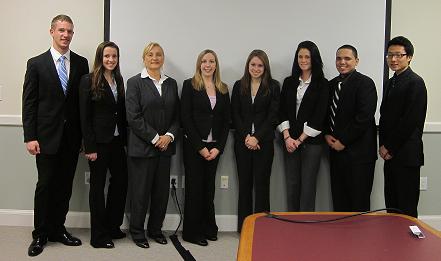
Bentley University Students Partner with Massachusetts Health Council to Assess Problem of Health Literacy
During the Fall 2011 semester, Bentley University juniors and seniors enrolled in the Human Relations in Healthcare Organizations class, led by Psychology Professor Helen Meldrum, were invited to work with the Massachusetts Health Council to help the assess the growing problem of low health literacy in relation to patients’ understanding of their prescription, over-the-counter and alternative medications. The Massachusetts Health Council is a non-profit, non-partisan statewide organization of more than 150 governmental and voluntary agencies, consumer and advocacy groups, professional societies, and private corporations committed to improving and protecting the health of the residents of the Commonwealth.
From September to December 2011, Bentley students conducted research on behalf of the Council. The Council was particularly interested in where patients get their information about medications - from their doctor or pharmacist or by simply by searching for answers on the internet? To address this, Bentley students surveyed over 300 individuals living or working in Middlesex County, Mass. Some of the findings included:
- Lower income patients actually feel more confident than higher income patients that they know the main side effects of their medications.
- Female respondents also felt more confident than males that they knew about the effects of their prescription medications.
- Approximately 63% of the respondents maintain a list of medications that they take. However, only half of this group always keeps the information readily available in case of an emergency.
- There was a positive correlation between a higher level of education and the use and belief that herbal, homeopathic, and/or vitamin-based remedies can have a positive effect on health.
After seeing the students' final presentation, Susan Servais, executive director of the Mass. Health Council stated, “The report put together by the Bentley research team will enable us to look at data associated with the challenges of understanding and effectively utilizing health information and come up with solutions to better educate the Commonwealth. People with low health literacy are more likely to be hospitalized, use emergency rooms, experience medication and treatment errors, and are less likely to follow through with prescribed treatments, thus putting an unnecessary strain on the state’s healthcare system.”
The team of Bentley students also offered several suggestions for the Council to improve the their outreach efforts, for example, by better publicizing the availability of free wallet-sized medication cards and suggested a follow-up study to examine how medication knowledge is influenced by advertising, news, and other media coverage.
Ms. Servais added, “We are grateful that the Bentley students were willing to serve as our principal investigators on this vitally important project. In this age of spiraling health care costs, one solution is to improve health literacy among our population. This report is a step in doing so.”

